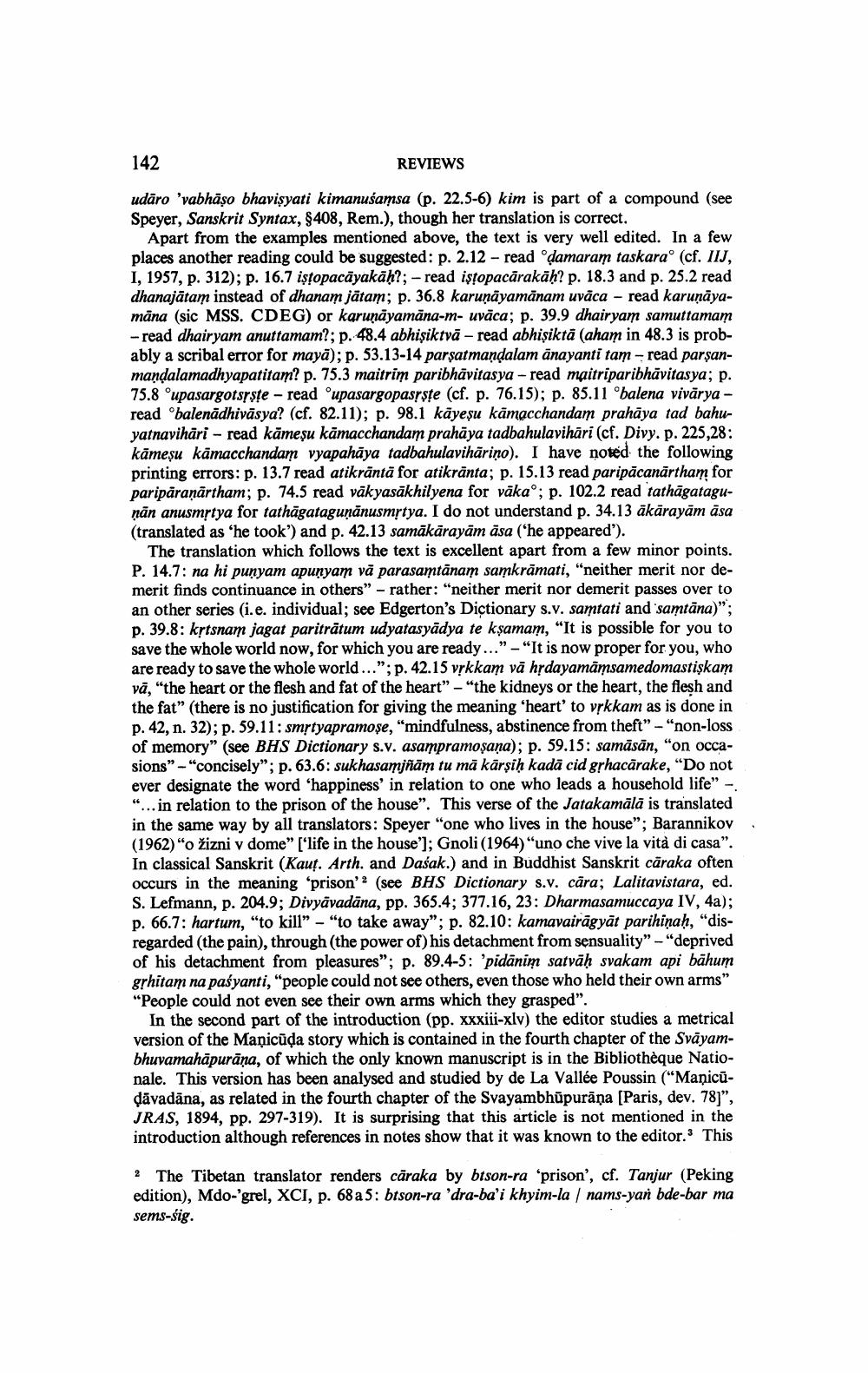Book Title: Reviews Of Different Books Author(s): Publisher: View full book textPage 6
________________ 142 REVIEWS udaro 'vabhaso bhavisyati kimanusamsa (p. 22.5-6) kim is part of a compound (see Speyer, Sanskrit Syntax, $408, Rem.), though her translation is correct. Apart from the examples mentioned above, the text is very well edited. In a few places another reading could be suggested: p. 2.12 - read degdamaram taskarao (cf. IIJ, I, 1957, p. 312); p. 16.7 istopacayakah?; - read istopacarakah? p. 18.3 and p. 25.2 read dhanajatam instead of dhanam jatam; p. 36.8 karunayamanam uvaca - read karunayamana (sic MSS. CDEG) or karunayamana-m- uvaca; p. 39.9 dhairyam samuttamam - read dhairyam anuttamam?; p. 48.4 abhisiktva - read abhisikta (aham in 48.3 is probably a scribal error for maya); p. 53.13-14 parsatmandalam anayanti tam - read parsanmandalamadhyapatitam? p. 75.3 maitrim paribhavitasya - read maitriparibhavitasya; p. 75.8 degupasargotsrste - read oupasargopasrste (cf. p. 76.15); p. 85.11 'balena vivarya - read balenadhivasya? (cf. 82.11); p. 98.1 kayesu kamacchandam prahaya tad bahuyatnavihari - read kamesu kamacchandam prahaya tadbahulavihari (cf. Divy. p. 225,28: kamesu kamacchandam vyapahaya tadbahulaviharino). I have noted the following printing errors: p. 13.7 read atikranta for atikranta; p. 15.13 read paripacanartham for pariparanartham; p. 74.5 read vakyasakhilyena for vakao; p. 102.2 read tathagatagunan anusmrtya for tathagatagunanusmrtya. I do not understand p. 34.13 akarayam asa (translated as 'he took') and p. 42.13 samakarayam asa ('he appeared'). The translation which follows the text is excellent apart from a few minor points. P. 14.7: na hi punyam apunyam va parasamtanam samkramati, "neither merit nor demerit finds continuance in others" - rather: "neither merit nor demerit passes over to an other series (i.e. individual; see Edgerton's Dictionary s.v. samtati and samtana)"; p. 39.8: kstsnam jagat paritratum udyatasyadya te ksamam, "It is possible for you to save the whole world now, for which you are ready..." - "It is now proper for you, who are ready to save the whole world..."; p. 42.15 vrkkam va hrdayamamsamedomastiskam va, "the heart or the flesh and fat of the heart" - "the kidneys or the heart, the flesh and the fat" (there is no justification for giving the meaning 'heart' to vrkkam as is done in p. 42, n. 32); p. 59.11: smrtyapramose,"mindfulness, abstinence from theft" - "non-loss of memory" (see BHS Dictionary s.v. asampramosana); p. 59.15: samasan, "on occasions"-"concisely"; p. 63.6: sukhasamjnam tu ma karsih kada cid grhacarake, "Do not ever designate the word 'happiness' in relation to one who leads a household life" - "... in relation to the prison of the house". This verse of the Jatakamala is translated in the same way by all translators: Speyer "one who lives in the house"; Barannikov (1962) "o zizni v dome" ["life in the house']; Gnoli (1964)"uno che vive la vita di casa". In classical Sanskrit (Kaut. Arth. and Dasak.) and in Buddhist Sanskrit caraka often occurs in the meaning 'prison' (see BHS Dictionary s.v. cara; Lalitavistara, ed. S. Lefmann, p. 204.9; Divyavadana, pp. 365.4; 377.16, 23: Dharmasamuccaya IV, 4a); p. 66.7: hartum, "to kill" - "to take away"; p. 82.10: kamavairagyat parihinah, "disregarded (the pain), through (the power of) his detachment from sensuality" - "deprived of his detachment from pleasures"; p. 89.4-5: 'pidanim satvah svakam api bahum grhitam na pasyanti, "people could not see others, even those who held their own arms" "People could not even see their own arms which they grasped". In the second part of the introduction (pp. xxxiii-xlv) the editor studies a metrical version of the Manicala story which is contained in the fourth chapter of the Svayambhuvamahapurana, of which the only known manuscript is in the Bibliotheque Nationale. This version has been analysed and studied by de La Vallee Poussin ("Maniculavadana, as related in the fourth chapter of the Svayambhupurana (Paris, dev. 78)", JRAS, 1894, pp. 297-319). It is surprising that this article is not mentioned in the introduction although references in notes show that it was known to the editor. This 2 The Tibetan translator renders caraka by btson-ra "prison', cf. Tanjur (Peking edition), Mdo-'grel, XCI, p. 68 a 5: btson-ra 'dra-ba'i khyim-la nams-yan bde-bar ma sems-sig.Page Navigation
1 ... 4 5 6 7 8 9 10 11 12 13 14 15
